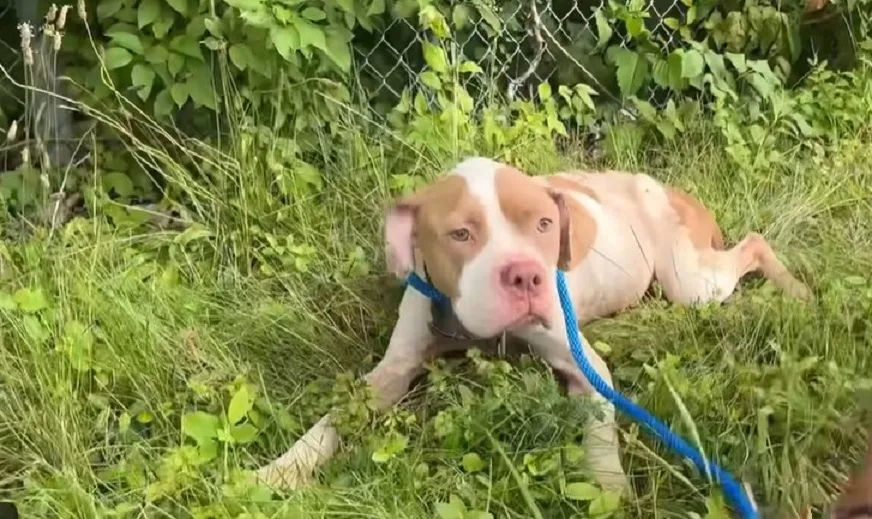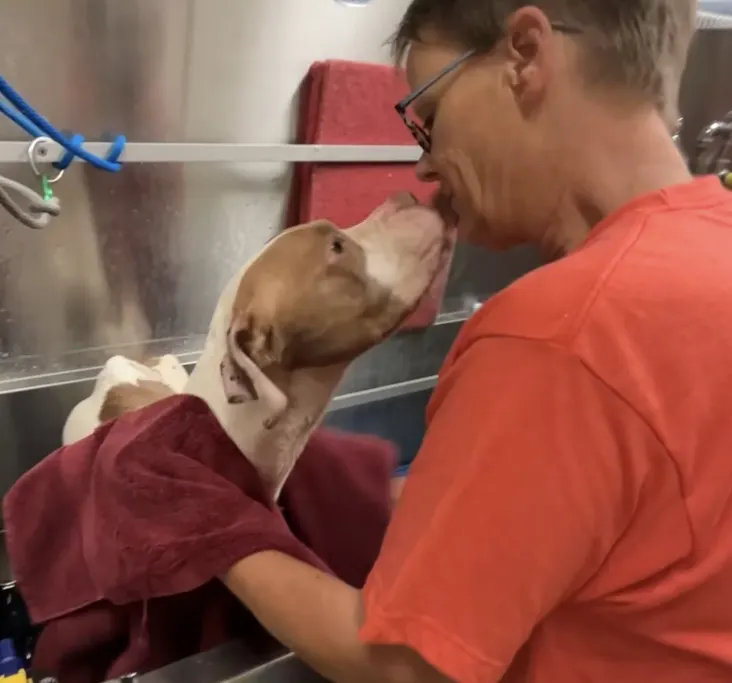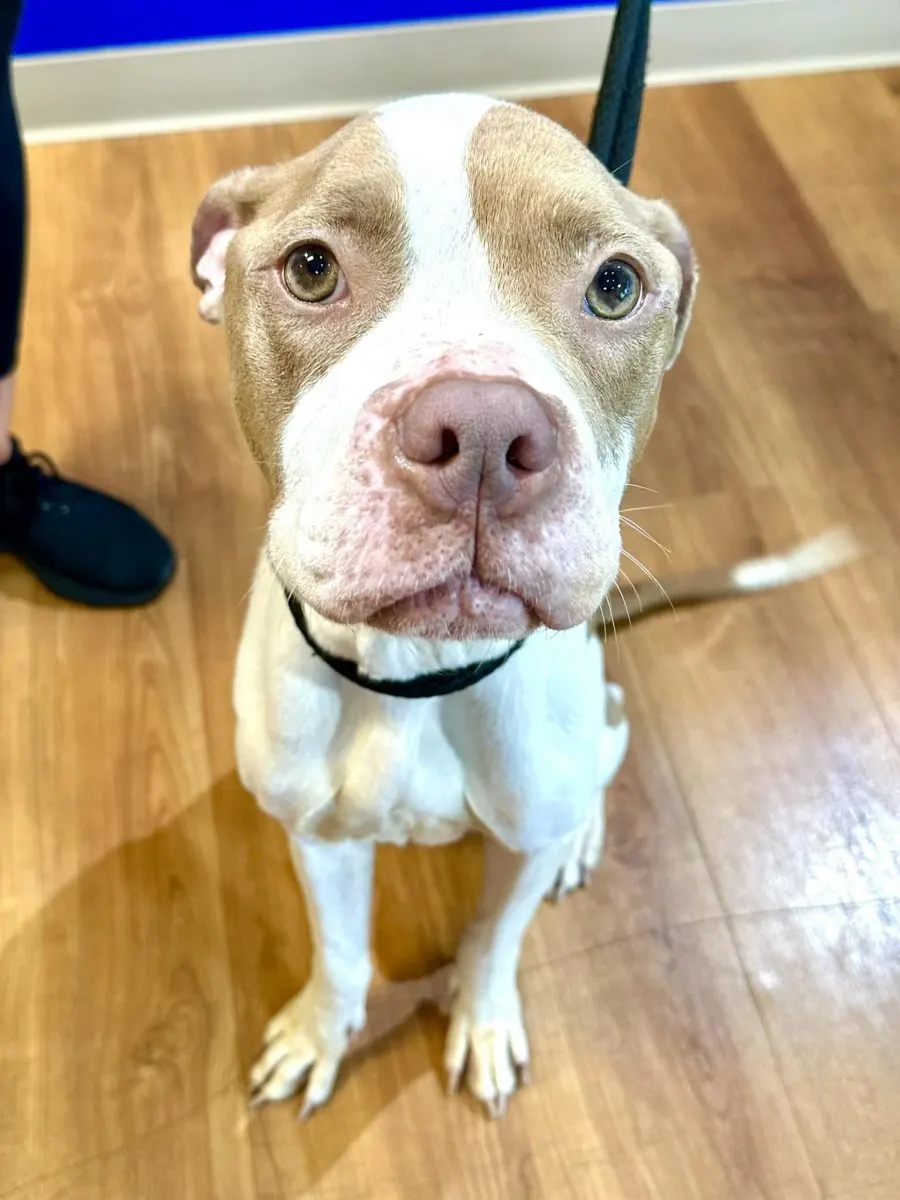Stray dogs roam the streets, looking for food and shelter. Their days are filled with fear and uncertainty. Some stray pups find themselves at dangerous places where they can’t find anything to eat.
Their strength fails them as they wait for kind-hearted people to rescue them and give them hope for a better tomorrow.
Miley was waiting for good humans to save her, too, as she was helplessly lying in the grass on the side of a highway without the strength to get up.
The Good People Step In To Help

In July 2023, many people contacted Stray Rescue of St. Louis, informing them that there was a stray dog on the side of a highway.
After one of the callers gave the rescue the exact mile marker of the highway, the rescue staff knew where the dog was.
Knowing that the frightened dog could run away at any moment, Donna Lochmann immediately went to save the pup.
As soon as she came to the exact spot that the caller mentioned, she saw a frightened dog lying in the grass. Lochmann felt brokenhearted after she saw how emaciated and tired she looked.
The rescuer didn’t want to scare the pup even more, so she slowly made her way down the slope. The pooch looked at her with a sad expression on her face.
While she talked to the pup in a gentle and soothing manner, Lochmann gave her some treats to win her trust.
Grateful To Be Saved

The sad and lonely dog recognized the friend in her and started wiggling her tail. She felt relieved that somebody cared for her, and put in so much effort to help her.
The pup, later named Miley Marker, let her rescuer put a leash around her neck. As she tried to stand up, her weak legs wobbled and she gave up.
Lochmann was deeply saddened to see that Miley didn’t have the strength to get up.
Just when she got closer to Miley to take her in her arms, the pup gave her a big kiss and melted her heart.
While Lochmann was carrying her up a steep hill to her car, the sweet pooch kept kissing her.
It was her way of thanking her rescuer for saving her life and treating her with so much care and affection.
After arriving at Stray Rescue of St. Louis, Miley had a full medical checkup. Her caregivers were heartbroken to learn that she was sick. She was so starved that she ate anything that she could find on the highway.
Lochmann gave her a bath to remove all the fleas from her body, and Miley couldn’t wait to give her rescuer another smooch.

Miley’s caregivers strongly believed that she would make a full recovery. Despite the terrible conditions she lived in, she was extremely affectionate, and everybody who met her ended up falling in love with her.
Her caregivers gave her all their love, and they couldn’t stop hugging this brave and invincible girl. Miley felt loved and safe like never before.
A New Chapter In Miley’s Life

Soon, she was ready to go to foster care and begin a new chapter in her life.
Her foster family was happy to welcome her into their home in St. Louis and help her regain her strength. They gave her a red fish toy and Miley was overjoyed with it. She carried that everywhere she went.
Miley needed some time to relax and catch up on sleep. It didn’t take long for her to start enjoying the warmth and safety of her loving home. Gradually, she became more and more energetic.
Her foster family was enchanted with her.
“Miley is the sweetest, most loving (and goofy) girl. When I am on Zoom meetings for work, Miley usually dozes off at my feet. She will suddenly wake up, jump into my lap at full speed, and start licking my face incessantly,” said Rachel, her foster mom.
Searching For A Forever Home

Her foster mom said that it was Miley’s way of expressing her gratitude to her. The sweet pup was overjoyed to have been rescued.
Miley made a complete recovery, and at the time of writing this article, she was searching for her forever home.
We’re absolutely sure that a pup as sweet as her will soon find wonderful parents who will endlessly love her and cherish her like she deserves.
If you’re ready to welcome a pup into your life, contact Stray Rescue of St. Louis and let sweet Miley win your heart. You’ll change her life forever, and in return, you’ll get a loyal and loving companion.
Are you a dog owner who loves to spoil your furry friend with treats? As the holiday season approaches, you may find yourself tempted to share some of your delicious ham with your canine companion. But before you do, it’s important to understand the potential risks involved. In this article, we will explore whether or not ham is bad for dogs and what you should consider before feeding it to your four-legged friend.
When it comes to ham, it’s important to remember that dogs have different dietary needs than humans. While ham may be a tasty and indulgent treat for us, it can pose health risks for our furry companions. Ham is a processed meat that often contains added salt, preservatives, and other seasonings that can be harmful to dogs. Additionally, it is high in fat, which can lead to digestive upset and more severe health issues like pancreatitis. So, is ham really bad for dogs? Let’s delve into the details and find out.
Is Ham Bad for Dogs?
As a dog owner, you may wonder if it’s safe to share some ham with your furry friend. But is ham bad for dogs? The answer is both yes and no, depending on the amount and frequency of consumption.
Small Amounts: A little nibble of ham here and there is unlikely to cause any harm to your dog. However, it’s important to keep in mind that ham offers no nutritional benefit for dogs. It’s high in animal fat, sodium, sugar, and preservatives like nitrates, all of which can be harmful or even toxic to your dog’s health. The high sodium and fat content in ham can be particularly detrimental.
Large Amounts: Feeding your dog significant amounts of ham regularly can pose health risks. Ham is a processed meat, often containing added salt, preservatives, and seasonings that can be harmful to dogs. The excess fat in ham can lead to digestive upset and more serious health issues, such as pancreatitis. Additionally, since pigs are often given antibiotics and hormones, the fat from many hams may not be the healthiest for your dog.
Given these factors, it’s best to err on the side of caution and limit your dog’s consumption of ham. While dogs are omnivores and can eat different types of meat, along with fruits and vegetables, ham should not be a regular part of their diet.
Small amounts of ham are generally not bad for dogs, but they are also not good for them. If you do choose to share a little ham with your dog, opt for naturally cured ham from pasture-raised pigs. Remember to prioritize your dog’s overall dietary needs and consult with your veterinarian for specific guidance on their diet.
Remember, your dog’s well-being is always the most important consideration.
How Much Ham Is Too Much for a Dog?
When it comes to feeding your dog ham, moderation is key. While small amounts of ham as an occasional treat may not be harmful, feeding your dog too much ham can lead to various health issues. Here’s what you need to know about how much ham is too much for your furry friend:
- High fat and sodium content: Ham is known for its high fat and sodium content, which can be detrimental to your dog’s health if consumed in excess. A diet high in fat can lead to obesity and related health problems in dogs.
- Digestive upset: Feeding your dog large quantities of ham can cause an upset stomach, leading to vomiting and diarrhea. If your dog shows signs of discomfort or starts vomiting after eating ham, it’s important to seek veterinary advice immediately.
- Pancreatitis: The consumption of fatty foods like ham can increase the risk of pancreatitis in dogs. Pancreatitis is a condition characterized by inflammation of the pancreas and can be life-threatening if left untreated. Symptoms of pancreatitis include abdominal pain, loss of appetite, vomiting, and diarrhea.
- Bones and choking hazards: Ham bones, whether cooked or raw, should never be given to dogs. Cooked ham bones can easily splinter and cause choking or internal injuries, while raw ham bones may contain harmful bacteria. If your dog ingests a ham bone or shows signs of constipation or illness, contact your veterinarian immediately.
- Tooth decay: Sweetened ham or ham with added sugars can contribute to tooth decay in dogs. The sugars in ham can promote the growth of harmful bacteria in the mouth, leading to dental issues such as cavities and gum disease.
Risks of Feeding Ham to Dogs
When it comes to feeding ham to your dog, there are several risks you should be aware of. While ham may not be toxic to dogs, it contains high levels of fat, salt, and sometimes sugar, which can have harmful health consequences for your furry friend.
1. Upset Stomach: One of the most common side effects of feeding your dog ham is an upset stomach, which can manifest as vomiting and diarrhea. This can be particularly problematic if your dog develops severe symptoms, leading to dehydration or even pancreatitis.
2. Choking Hazards: Feeding ham bones, whether cooked or raw, to your dog is extremely risky. The bones can pose a choking hazard, risk causing intestinal blockages, or even result in death. It’s crucial to never give your dog any kind of ham bones to avoid these dangers.
3. Weight Gain and Obesity: Feeding ham to your dog over a long period of time can lead to weight gain and obesity. Ham is high in fat and calories, and these excess calories can accumulate, especially in small dogs with low calorie requirements. It’s important to monitor your dog’s weight and ensure a balanced diet to prevent obesity-related health issues.
4. Tooth Decay: If you frequently give your dog sweetened ham, it can contribute to tooth decay. The sugar content in ham can lead to dental problems, such as cavities and periodontal disease. It’s essential to prioritize your dog’s oral health and avoid feeding them sweetened ham as a preventive measure.
Remember, if your dog shows any signs of discomfort or illness after consuming ham, it’s crucial to seek veterinary advice. They can provide appropriate guidance based on your dog’s specific needs.
Feeding ham to your dog can pose several risks to their health, including upset stomach, choking hazards from bones, weight gain, and tooth decay. Understanding these risks will help you make informed decisions about what to feed your furry friend.
Conclusion
Feeding ham to your dog can pose potential health risks due to its high fat, salt, and sugar content. It’s important to remember that moderation is key when it comes to sharing human food with your furry friend. While ham may be a tasty treat for you, it’s best to avoid giving it to your dog on a regular basis.
The risks associated with feeding ham to dogs include upset stomach, choking hazards from bones, weight gain, and tooth decay. If your dog shows any signs of discomfort or illness after consuming ham, it’s crucial to seek veterinary advice.
Remember, there are plenty of other safe and healthy options to treat your dog. Stick to dog-friendly foods that are specifically formulated to meet their nutritional needs. By making informed choices about what you feed your dog, you can help ensure their overall health and well-being.
Frequently Asked Questions
What are the potential health risks of feeding ham to dogs?
Feeding ham to dogs can have harmful health consequences. Ham has a high fat, salt, and sugar content, which can lead to an upset stomach, weight gain, and tooth decay in dogs. It can also present a choking hazard due to the bones in ham.
Can dogs eat ham in moderation?
Ham in moderation is safe for dogs to eat, but too much ham can be dangerous. It’s important to consider the high fat and sodium content of ham, which can lead to health issues in dogs if consumed in excess.
Can dogs eat cooked ham?
While dogs can eat cooked ham, it’s important to be cautious. The fatty richness of ham can be difficult for dogs to digest, and too much fat can lead to pancreatitis and other digestive upsets. It’s best to limit your dog’s consumption of cooked ham.
Is Christmas ham safe for dogs?
Feeding ham, nuts, and other festive fare to dogs is not recommended. Our veterinarians warn against feeding Christmas ham to dogs, as it can pose potential health risks due to its high fat, salt, and sugar content. It’s best to avoid giving Christmas ham to dogs to ensure their well-being.
[no_toc]

Hey there, I’m Janet Brooks, a dog-loving student from California. I’m all about helping pups in need, especially those without homes. Me and my awesome friends work together to give shelter and love to stray dogs. Oh, and I also write blogs about dogs to share helpful info.
